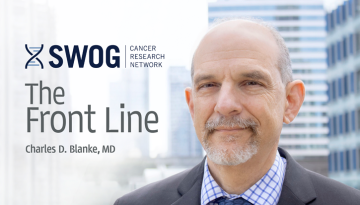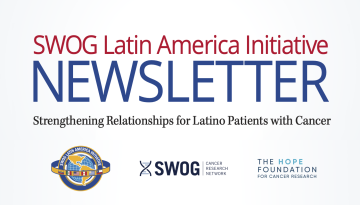A New Season for SWOG’s Innovation Incubator
So you’re a young investigator, and you want to run a cutting-edge cancer trial. Maybe one that hunts for biomarkers for lymphoma. Or one that studies an immune-blocking drug for head and neck cancer. Or maybe you want to create a new 3D tissue model – aka an “organoid” – to use in pancreatic cancer research.
Work is underway on all these trial ideas, led by SWOG early career investigators and collaborators at The Jackson Laboratory (JAX) and Cold Spring Harbor Laboratory (CSHL). All three ideas came out of a three-day cancer science and medicine mashup – and it’s coming around again.
Applications are open now for the 2016 Integrated Translational Science Center Workshop, which runs August 31 through September 2 at The Jackson Laboratory’s scenic 43-acre campus in Bar Harbor, ME. The session connects early career SWOG investigators with basic scientists at JAX and CSHL, and is aimed at generating new SWOG clinical trials with a strong translational medicine component. Note: It’s free. All expenses for the workshop, including meals and travel, are paid for by the National Cancer Institute and The Hope Foundation with considerable support from our partners at JAX and CSHL.
I can’t say enough about the importance of this opportunity.
We don’t lack for innovative trial ideas here at SWOG. But we often lack the scientific expertise, laboratory tools, and human connections needed to run a successful translational medicine trial. The Integrated Translational Science Center provides all of these elements, and, in the process, acts as SWOG’s own innovation incubator.
Last year, the first workshop was held at Cold Spring Harbor’s fabled Banbury Center, and attracted 11 SWOG young investigators, 10 scientists from CSHL and six from JAX. In lectures, small discussion groups, and lab visits, workshop attendees talked tools and technologies, ranging from genetically engineered mice to RNA analytics to patient-derived tumor grafts. Investigators got the benefit of the brains – and tools – of some of the nation’s best applied scientists. And those scientists, in turn, learned a lot about cancer medicine from our clinical investigators.
The workshop goal is practical and actionable. Young investigators come out with an exciting, and viable, cancer clinical trial idea. Because there is even a grant program that could fund it, thanks to the NCI, CHSL, JAX and The Hope Foundation. The SWOG ITSC Pilot Grants program provides up to $100,000 to obtain preliminary data for a translational trial, data that can be used to create a protocol or pursue another grant. Last year, Hope awarded six ITSC Pilot Grants – and four of the funded teams had taken part in the ITSC workshop in Bar Harbor.
So if you’re new to cancer clinical trials, and are curious about integrating the bench with your bedside experience, ask to be nominated for the program. Anyone from a SWOG member institution can nominate you by providing a letter of support along with your CV. Alternately, senior investigators, if you know a young SWOG researcher who could take advantage of this opportunity, please send them this post.
Note: Applications are due June 1. A total of 10-15 participants will be selected, largely on their level of interest and the quality of their ideas. To learn more, visit The Hope Foundation website.
Get your name in! It could be the start of a terrific trial, one made possible by a terrific public-private partnership. Special thanks go out to Drs. David Tuveson, Ed Liu, Larry Baker, Lee Ellis, and Anne Schott, and to the entire staff at both world-class labs for making this workshop possible.
If you haven't taken our digital engagement survey for members, please do! Go to Survey Monkey to fill one out.
Other Recent Stories



